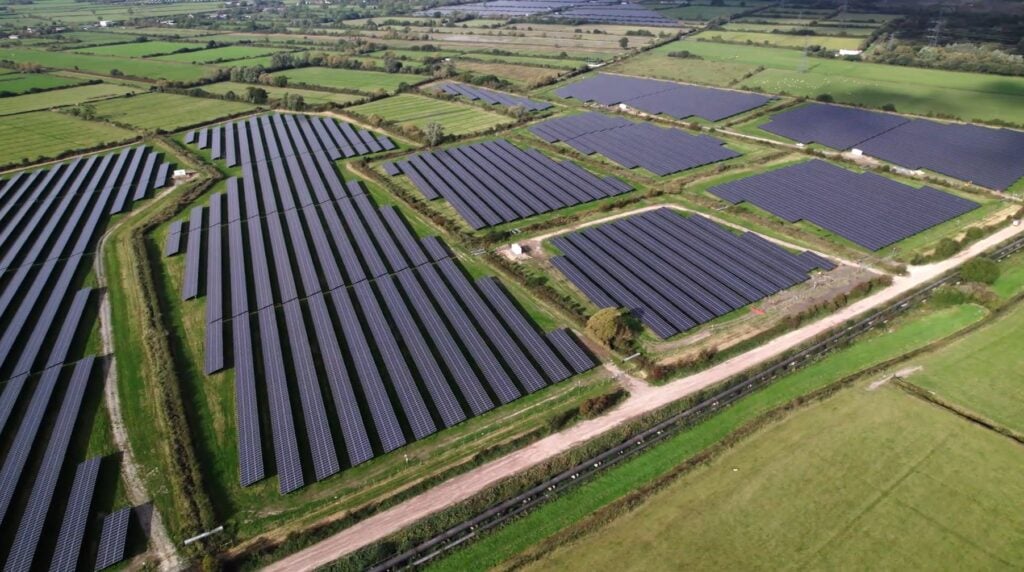
“The biggest issue with the solar sector currently is the grid and the workforce”, said Mark Wakeford, chairman of EvoEnergy, when discussing the role of the Solar Taskforce and some of its key findings thus far.
Speaking at an industry event today (30 April), Wakefield, chair of the Taskforce’s ‘skills’ group, emphasised that the grid needs further investment and support to enable renewable generation technologies, such as solar, to decarbonise the energy system.
Lawrence Slade, chief executive of the Energy Networks Association, added to this debate, stating that although the transmission entry capacity (TEC) register queue has now reached over 700GW, not all of these projects will be required to achieve net zero in Britain.
“We hear a lot about the queue, which has over 700GW waiting to be connected right now. This is much higher than what we need. Many reforms are going on right now that are freeing up capacity – some of which are getting connection dates almost six and a half years sooner,” Slade said.
“The Taskforce is really putting that into perspective.”
As stated by Slade, the Solar Taskforce is clearly working to ensure that grid connection delays are mitigated and that both solar and battery storage projects can connect to the grid in a timely fashion—particularly via the newly introduced “first ready, first connected” approach to connections, implemented by National Grid ESO.
Solving the skills gap conundrum
Another major obstacle in the solar sector is the skills gap and, more importantly, the incentivising of younger academics to enter the renewable and solar sector.
Skills have become an important part of the Taskforce’s activities. As previously reported on Solar Power Portal, the Taskforce’s skills group aims to identify how to develop and deliver the skills and training needed for the future solar workforce in the short and long term.
Touching on this topic, Wakefield said: “The workforce numbers for the industry used to be difficult, now professionalising the roles is. Professionals are needed to deliver a competent, quality product for the industry. For this, we need to get people qualified.
“We have quite a lot of work to do to identify qualifications and routes to qualifications for the industry.”
Slade also contributed to the discussion about jobs in the solar and renewable industries. Specifically, he emphasised that a job in the renewable industry is a “career for life,” highlighting the importance of getting new generations of workers to see the potential in building a career in the sector.
Development of a domestic supply chain
Another key discussion point made by Chris Hewett, chief executive of Solar Energy UK, centred around creating a domestic supply chain for solar.
“We won’t have gigawatt-scale solar panel manufacturing factories but there is a lot of potential in domestic supply chain development. This is something we can build up,” Hewett said.
Creating a supply chain for solar and renewable technologies could be key to supporting the UK’s net zero ambitions while bolstering the economy. By supporting domestic manufacturers, renewable technologies, such as battery storage, could be developed and made in the country, thus decreasing the nation’s susceptibility to geopolitical tensions.
This has been a key discussion point in the renewable industry. Late last year, The Royal United Services Institute (RUSI) argued that the UK risks becoming “too reliant” on China for its renewable transition.
According to the report, aptly named New Energy Supply Chains: Is the UK at Risk from Chinese Dominance, the RUSI argued that China has a “near monopoly” in the mineral processing supply chain, taking up a staggering 80-100% market share. Rare earth materials are another supply chain China dominates, and they are often used to manufacture permanent magnets in wind turbines and electric vehicles (EVs).
Batteries, wind turbines and solar are also cited as technologies that the UK relies heavily on China to develop. This has prompted concerns about energy security, particularly in the wake of the Russian invasion of Ukraine, which saw energy prices skyrocket across the globe due to a reduction in the supply of gas and oil from Russia.
For the solar industry, China also has a “near monopoly” on the production of polysilicon, silicon wafers and silicon cells, RUSI said. There are also very high concentrations of up to a 60–80% market share in many other elements of these supply chains.
Supporting the creation of domestic supply chains could only bolster the UK’s energy independence while also creating domestic green jobs.
Solar Power Portal’s publisher Solar Media will host the UK Solar Summit on 4-5 June 2024 in London. The event will explore the UK’s new landscape for utility and rooftop solar, looking at the opportunities within a GW+ annual market, and much more.

